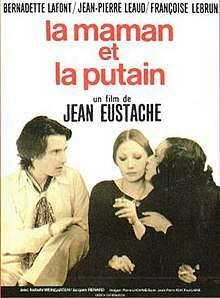The Mother and the Whore
The Mother and the Whore (French: La Maman et la Putain) is a 1973 French film directed by Jean Eustache and starring Jean-Pierre Léaud, Bernadette Lafont and Françoise Lebrun. An examination of the relationships between three characters in a love triangle, it was Eustache's first feature film and is considered his masterpiece. Eustache wrote the screenplay drawing inspiration from his own relationships, and shot the film from May to July 1972.
| The Mother and the Whore | |
|---|---|
 Film poster of The Mother and the Whore | |
| Directed by | Jean Eustache |
| Produced by | Vincent Malle Bob Rafelson |
| Written by | Jean Eustache |
| Starring | Bernadette Lafont Jean-Pierre Léaud Françoise Lebrun |
| Cinematography | Pierre Lhomme |
| Edited by | Denise de Casabianca Jean Eustache |
Release date | May 1973 (Cannes Film Festival) |
Running time | 219 min |
| Country | France |
| Language | French |
| Budget | 700,000 francs |
The film screened at the 1973 Cannes Film Festival, where it won the Grand Prix. With some divided initial critical reaction, it has been championed by later critics and filmmakers.
Plot
In Paris, Alexandre, an unemployed young man with memories of the May 1968 events in France, attempts to persuade his former love, Gilberte, to marry him. Gilberte opts to instead marry another man. Alexandre is involved with a live-in girlfriend called Marie, and is interested in films such as The Working Class Goes to Heaven. One day, after an unsuccessful reconciliation with Gilberte at the highly popular Les Deux Magots café, he meets Veronika, a Polish French twenty-something nurse. In the midst of the sexual revolution, Veronika is highly promiscuous, and begins to make advances on Alexandre.
During the summer of 1972, Alexandre and Marie are nude in bed in their apartment when Veronika visits. Marie lets her in and Veronika insults both of them, but acknowledges she is not pure herself. The three begin a ménage à trois and sleep in the same bed, with Veronika assuring Alexandre she and Marie both love him, and telling him to be more happy with his situation and life. Although Marie affirms her indifference to Alexandre's affairs, she quickly changes her mind when she sees how close he becomes to Veronika. This leads to a growing estrangement between her and Alexandre. As the three sit together, Veronika attempts to reassure Marie about her looks and body. Tearfully, Veronika speaks about how she believes no women are truly whores, and how love is meaningless unless it produces a child.
Cast
- Bernadette Lafont as Marie
- Jean-Pierre Léaud as Alexandre
- Françoise Lebrun as Veronika
- Isabelle Weingarten as Gilberte
- Jacques Renard as Alexandre's friend
- Jean-Noël Picq as Offenbach's lover
- Geneviève Mnich as Veronika's friend
- Caroline Loeb
- André Téchiné
- Jean-Claude Biette
- Pierre Cottrell
- Jean Douchet
- Douchka
- Bernard Eisenschitz
- Noël Simsolo
- Berthe Granval
- Jean Eustache as the man at the supermarket
Production
In 1972 Eustache had begun to doubt his career in films and contemplated quitting the business. He told a reporter from Le Nouvel Observateur "If I knew what it was that I wanted, I wouldn't wake up in the morning to make films. I'd do nothing, I'd try to live without doing or producing anything." Soon afterwards he got a new idea for a film to make with his friends Jean-Pierre Léaud and Bernadette Lafont; he also brought in his ex-lover Françoise Lebrun who at that time was a literature student and had never acted before. Eustache was loaned money from friend Barbet Schroeder to spend three months writing the script, which was over three hundred pages. Although the film often seems to be highly improvised, every word of dialogue was written by Eustache.[1] The film was very autobiographical and was inspired by Eustache's various relationships, such as his then recent breakup with Françoise Lebrun and romantic relationships with Marinka Matuszewsk and Catherine Garnier. Many of the locations used in the film were places that Garnier had lived or worked. The character played by Jacques Renard was based on Eustache's friend Jean-Jacques Schuhl.[2][3]

The film was shot between May 21 and July 11, 1972.[4] on a budget of 700,000 francs. Eustache called it a very hostile film, and it mostly consisted of dialogues and monologues about sex. Eustache says that the character Alexandre is "destroying [the three lead characters], but he is looking for it all along. After his voyage into madness and depression, he ends up alone. That's when I stop the film."[1] Filming locations included Les Deux Magots Café, the Café de Flore, the Café le Saint-Claude, the Laennec Hospital, the Blue Train restaurant and inside various apartments on the Rue de Vaugirard and Rue Vavin.[5] The film had no musical score and only used natural sounds and occasionally music played by the characters on phonographs, such as Wolfgang Amadeus Mozart, Edith Piaf, Marlene Dietrich and Deep Purple.[6]
Eustache described the film as a "narrative of certain seemingly innocuous acts. It could be the narrative of entirely different acts, in other places. What happens, the places where the action unfolds, have no importance...My subject is the way in which important actions situate themselves in a continuum of innocuous ones. It's the description of the normal course of events without the schematic abbreviation of cinematographic dramatization."[1]
Luc Béraud is assistant director on the movie.
Reception
The Mother and the Whore is considered Eustache's masterpiece, and was called the best film of the 1970s by Cahiers du cinéma. It won the Grand Prix of the Jury and the FIPRESCI prize at the 1973 Cannes Film Festival. The film created a scandal at the Cannes Film Festival, as many critics saw the film as immoral and obscene or, in the words of the broadsheet Le Figaro, "an insult to the nation", while Télé-7-Jours called it a "monument of boredom and a Himalaya of pretension".[1] On its initial run the film sold over 343,000 tickets in France.[7]
After gaining little public recognition despite receiving praise throughout the years from critics and directors, such as François Truffaut and other members of the French New Wave, Eustache became an overnight success and internationally famous after the film's Cannes premiere. He soon financed his next film. The critic Dan Yakir said that the film was "a rare instance in French cinema where the battle of the sexes is portrayed not from the male point of view alone". James Monaco called it, "one of the most significant French films of the 1970s". Jean-Louise Berthomé said, "I am not sure that La mama et la putain, with its romances of a poor young man of 1972, doesn't say something new." Pauline Kael praised the film, saying it reminded her of John Cassavetes in its ability "to put raw truth on the screen – including the boring and the trivial".[1] Jean-Louis Bory of Le Nouvel Observateur gave the film a negative review, calling it misogynistic and criticizing the characterization of Alexandre.[8]
Legacy
The film's reputation has increased over time. In 1982, the literary magazine Les Nouvelles littéraires celebrated the tenth anniversary of the film by publishing a series of articles about it.[9]
It has been called one of the best films in French history by Jean-Michel Frodon[10] and Jean-Henri Roger.[11] Film director Olivier Assayas has especially praised the film and considers it an example of what to strive for in filmmaking.[12] It was ranked the second greatest French film of all time by a poll of filmmakers.[13][14]
Andrew Johnston, writing in Time Out New York, described his experience of viewing the film:
One of the great, if all-too-infrequent, pleasures of being a film critic is having your mind blown by a film you didn't expect much from. Such an incident occurred in December 1997, when I was assigned to review Jean Eustache's 1973 film The Mother and the Whore, then beginning a revival engagement at Film Forum. Yes, I'd heard that it was a classic of French cinema, but I wasn't exactly thrilled at catching an early-morning screening of a three-hour-and-thirty-five-minute black-and-white foreign-language film that reportedly consisted of little more than people sitting around and talking. Frankly, I was a lot more excited about seeing Scream 2 that evening. Little did I know, as I eased into my seat, that I was in for one of the most memorable cinematic experiences of my life.[15]
After a 2016 retrospective screening at the French Institute Alliance Française, film critic Richard Brody effusively praised Eustache's sophisticated portrayal of characters whose "intimate disasters have the feel of epic clashes."[16] Further, he sees the film as Eustache's "comprehensive vision" of radical politics and the Sexual Revolution in post-1968 France – a stark, regretful, and suspicious vision that Brody terms "ferociously conservative".[16] The film is also freely available on the internet.[17]
The film was adapted into a 1990 stage play by Jean-Louis Martinelli.[18] In 1996, the French rock band Diabologum utilized Veronika's monologue in a song named The Mom and the Whore on their album #3. Vincent Dieutre's 2008 film ea2, 2e exercice d'admiration: Jean Eustache paid tribute to Veronika's monologue.
References
- Wakeman, John. World Film Directors, Volume 2. The H. W. Wilson Company. 1988. pp. 311–313. ISBN 0-8242-0757-2
- Azoury, Philippe. Jean Eustache, une balle à la place du cœur. Les Inrockuptibles. December 5, 2006.
- Azalbert, Nicolas. Ombres blanches: Entretien avec Jean-Jacques Schuhl. Cahiers du cinema, no 687. March 2013. pp. 91-97
- Philippon, Alain. Jean Eustache. Paris: Cahiers du cinema, "Auteurs". 1986. ISBN 978-2866424282. p.114.
- Eustache, Jean. La Maman et la Putain:Scénario. Paris: Cahiers du cinema. 1986. ISBN 978-2866422080. pp. 35-42.
- Hanska, Evane. Mes années Eustache. Flammarion, Documents. 2001. ISBN 978-2080679208. pp. 325-326.
- "La Maman et la Putain". jpbox-office.com. Retrieved June 9, 2014.
- Bory, Jean-Louis (May 14, 1973). "Romance d'un jeune homme pauvre" (PDF). Le Nouvel Observateur. p. 79. Retrieved June 9, 2014.
- Powrie, Phil (March 2006). The cinema of France. Wallflower Press. pp. 133–141. ISBN 978-1-904764-46-5.
- Frodon, Jean-Michel (2010). Le Cinéma français, de la Nouvelle Vague à nos jours. Cahiers du cinema. p. 406.
- Cerf, Juliette (November 1, 2005). "L'Esprit de mai". Regards.
- Blanc, Cécile (2001). "Olivier Assayas: Une cinémathèque imaginaire". La bibliothèque du film. 92.
- Ribeton, Théo (July 29, 2013). La Maman et la Putain: pourquoi le film de Jean Eustache est-il presque invisible. Les Inrockuptibles.
- The 100 best French films: 10-2. Time Out. May 20, 2015.
- Time Out New York, April 29-May 6, 1999, p. 163.
- Brody, Richard (January 18, 2016). "Movies: 'The Mother and the Whore'". The New Yorker. Condé Nast: 12.
- Théo Ribeton. "Boris Eustache : Suis-je le gardien de mon père ?". Revue Zinzolin. Retrieved 2013-08-01.
- Chauvin, Serge (November 30, 1996). La Maman et la Putain. Les Inrockuptibles.